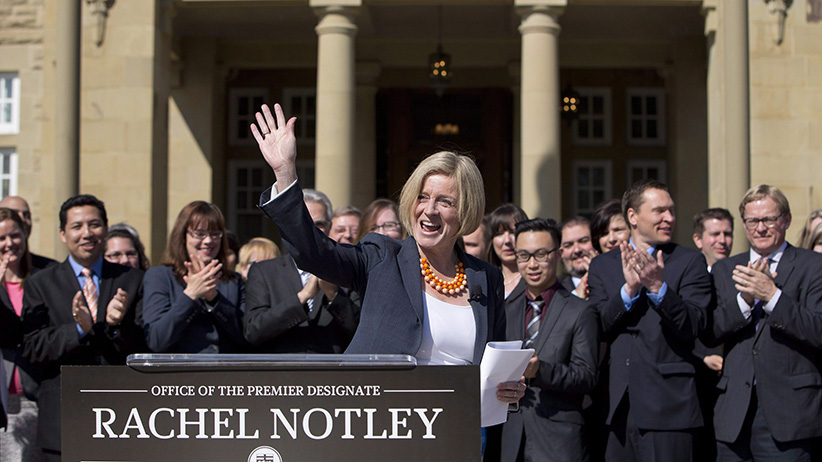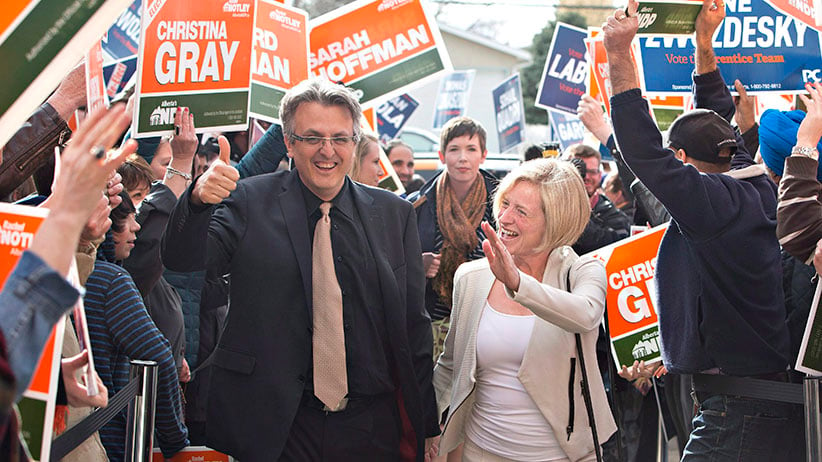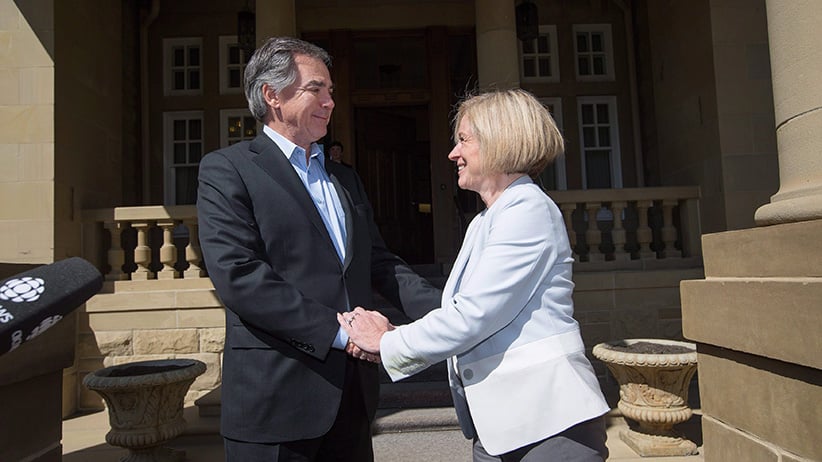How Rachel Notley became Canada’s most surprising political star
The new premier of Alberta loves a good argument. Her powers of persuasion helped turn her province’s political scene upside down
Alberta Premier-designate Rachel Notley addresses the media in front of her caucus in Edmonton, Alta., on Saturday, May 9, 2015. THE CANADIAN PRESS/Jason Franson
Share

Steve Notley, the celebrated indie cartoonist and video game designer whose older sister, Rachel, has become premier of Alberta, did not have a front-row seat for most of Alberta’s election. He lives and works in Seattle now, a safe distance from the scene of the political combat amidst which he grew up—and which he has never relished. But he made darn sure to be in Edmonton a few days before the transformative vote that annihilated the province’s long-ruling Conservatives and brought the Notley family business, Alberta’s New Democratic Party, to unexpected power.
“I didn’t really believe it until the evening of the election,” he says. “If you’re an NDPer in Alberta, it doesn’t really pay to have sky-high expectations of what your results are gonna be. Paradoxically, you have to be very conservative. That night, I went back to the Westin Hotel, up to the suite where Rachel and her family were waiting for the results. And I was asking her: ‘OK, so, you do have, like, several different speeches lined up for all the different outcomes that might transpire here?’
“She had one speech. And I thought to myself, ‘Huh. I guess she’s pretty sure this is happening.’ ”
Related: A look at Rachel Notley’s cabinet on the day of her swearing-in
Most Albertans, even many of the New Democrats gathered at the hotel for the vote-watching vigil, might not have been ready to believe that Rachel Notley, 51, was about to become premier designate. But she had decrypted the writing on the wall, and was already more nervous about the responsibilities ahead than she was about her acceptance speech. “We did joke about that,” Steve says. “There was a moment of, ‘Is it too late to turn this bus around?’ ” The siblings snickered about having the NDP leader log into Twitter and tweet unprintably rude things about Calgary at the last minute, in order to let her off the hook.
A little trepidation is understandable. Notley takes over an Alberta government facing low international oil prices, although, behind the headline numbers, the benchmark for the province’s synthetic oil is doing surprisingly well. She must also fashion a cabinet from material provided by rebellious voters after relatively little scrutiny. The median age of her caucus is 40. Her youngest new MLA, Thomas Dang, is 20.
Moreover, she may have little psychological leeway for ambitious policy moves. In a poll conducted by Abacus Data over the week following the election, Albertans were asked to choose between two different accounts of the outcome. They picked “people wanted change” over “people like the NDP” by a margin of 93 per cent to seven per cent. For now, Albertans are back to believing in political polls, and that one sounds about right.
If preparation is what counts most, Notley ought to be ready for the challenge. She is the daughter of W. Grant Notley, leader of Alberta’s NDP from 1968 to 1984. The elder Notley was a University of Alberta undergraduate at the time of the transition from the old Co-operative Commonwealth Federation to the less militant, utopian “New Party.” He first ran for the Alberta legislature in 1963, at the age of 24. It took until his fourth bid to make it into the Assembly: He finally made it in the northern riding of Spirit River-Fairview in 1971, entering alongside the first generation of Peter Lougheed PCs. Hailing from a farm near Didsbury, almost at the southern pole of the Edmonton-Calgary corridor, he was destined to raise his own children in the unfamiliar northern environs of the Peace River block.

Grant Notley was acknowledged even then to have missed his moment. It never proved possible for his NDP to get much political traction against a Progressive Conservative government that was socially liberal, in contrast with its Social Credit forerunners, and aggressive about state industrial planning. Notley belaboured the PCs over their links to, and open subsidies of, oil multinationals. He blasted Alberta’s meagre welfare arrangements, and humiliated the government into improving education for the disabled. Whenever the Conservatives slipped up, he was there to make them pay.
But oil money was falling from the sky. And, as the decade rolled on, and provincial battles with Ottawa became the dominant theme of Canadian politics, Notley could not afford to break ranks with either Lougheed or with his own NDP friends holding power in Saskatchewan. By 1984, the only net electoral progress he could claim was having been joined in the New Democrat “caucus” by his best friend, Ray Martin.
Rachel Notley’s mother, Sandra, was probably at least as large an influence as her father. While the husband was spending weekdays under the dome in Edmonton, the Massachusetts-bred wife was heavily involved in working for Anglican Church political causes: taking the kids to peace marches, editing the Church’s national magazine and organizing relief and advocacy for Africa. It was a somewhat ironic arrangement: Sandy stayed home in Fairview, pursuing her passion for international politics, while Grant travelled thousand of miles, fighting the Alberta government on a thousand petty local fronts.
On Oct. 19, 1984, a Friday, Grant Notley exited his office, drove to Edmonton’s municipal airport, and just managed to catch the last plane headed north—a Piper Chieftain that made a bargain-priced taxi run to Fairview and other boreal towns with small airstrips.
The day was bone-cold, foggy; the pilot, inexperienced and nervous. A co-pilot was bumped from the 10-seater to make room for Notley. Over the highest country Alberta has outside the Rockies, near-aptly named High Prairie, the Chieftain descended below the minimum safe altitude, as the frustrated pilot dipped below the clouds to look for the lights of his first stop. Notley and five others were killed immediately when the plane slammed into a ridge. Another northern MLA, PC housing minister Larry Shaben, escaped with terrible injuries.
The day after Grant’s funeral, Sandra had to take a call from a Canadian Press reporter to say she was willing to run in a by-election if the party insisted it would lose the seat without her. The party backed off. The president of the constituency association told CP, “We are reluctant to have Sandy sacrifice herself at this time.”
Rachel, a University of Alberta arts undergraduate at the time of her father’s death, was not discouraged. Her involvement in New Democrat politics dates back at least as far as 1989, when she was a delegate from Osgoode Hall Law School in Toronto to the federal NDP convention that chose Audrey McLaughlin as leader. (Notley backed the eventual second-place finisher, former B.C. premier Dave Barrett.) She headed the Alberta NDP’s election-planning subcommittee in 1991, failing to help stem the Liberal tide in Edmonton that saw the NDP lose all 16 of its Assembly members in 1993’s election.

Throughout her law career, Notley has mostly served labour unions in the field of occupational health and safety, representing workers in courts and before arbitration panels, and lobbying for stronger regulations and better access to worker compensation. For a taste of government power, though, she had to take a detour through NDP-run British Columbia. She moved to Vancouver in 1994 and ended up spending a year as an assistant to then-attorney general (and then-New Democrat) Ujjal Dosanjh.
“Ujjal wanted a lawyer—someone who could translate between ministry lawyers and real English,” says his chief of staff, Joanne Moody, now secretary-treasurer of a UNITE HERE—a hospitality trade union—local in Edmonton. “When I heard she was coming aboard, I was a little intimidated. Everyone knows the Grant Notley name and she had this splendid education. But she walked in the door and we hit it off within the first five minutes. It was a blast working with her. We got a lot done.”
“I hire the best,” boasts Dosanjh today. Notley, along with MLA Tim Stevenson, acted as the attorney general’s go-between to the NDP caucus on modernizing B.C. law, to set up maintenance enforcement and pension benefits for same-sex spouses. “If there were any problems—not that there was much resistance—I would send her and Tim to talk to colleagues. She didn’t have to be taught anything about that. She instantly understood the political side of the work.
“But she might have been even better behind the scenes. When you’re making a major legislative push, you have the bureaucrats come talk to you, and then there’s always a moment when they’ve left and you’re there in a room with your assistants—your political people. And you have a heart-to-heart talk about where you’re going, and she never held anything back. That’s what you want from an assistant. She is very bright, very confident, and knows her stuff.”
Friends of Notley don’t want to say she likes a good argument. They all balk when it is suggested explicitly: They like to emphasize that she is equally good, or better, as a listener. Moody speaks with astonishment of Notley’s ability to handle, while working for Dosanjh, the most difficult of all groups seeking redress from government: workers’ comp clients.
“Other people in the office would say condescendingly, ‘O-hoh, Rachel’s going to meet with some very interesting people today.’ But those people would come out of the meetings looking dumbstruck, telling us, ‘She actually understood what I was saying!’ They might not be happy with the outcome of the meeting, or with what she had to tell them, but they were often amazed, all the same.”
It is fairly obvious that Notley is a natural litigator. She likes to run and cycle; she cherishes her family; brother Stephen reports that she is a fan—it almost goes without saying—of the political TV comedies Parks & Recreation and Veep. But the prevalent image almost everyone paints of Notley is of dinner-table arguments with friends or co-workers over wine—preferably a malbec, says Adrienne King, Notley’s chief of staff for the election, and now deputy chief of staff to her as premier. “That’s a rite of passage, if you work for Rachel Notley.”
“She will certainly stand up for herself,” says Ray Martin. “But she doesn’t get upset or take things personally when she is presenting a position.” King agrees, adding that Notley’s handling of Jim Prentice’s notorious “math is difficult” attack during the debate reflected this. Notley corrected Prentice, but did not act hurt or outraged on camera, and even told reporters later she did not find his remarks disrespectful or objectionable.
“She was completely sincere about that,” says King. “I remember talking to her in the campaign van afterward, telling her I found [Prentice’s remark] offensive. Our press secretary chimed in: ‘I thought it was damned offensive!’ Plenty of people on social media, hundreds of them, found it offensive. Rachel almost couldn’t understand. She just said she didn’t think he meant it in any rude way.”
Notley’s reappearance in Alberta politics came in 2000, when she briefly came back to the province at a moment of trial for the party. It had been reduced to two seats in the 1997 election and, in a farcical echo of the crisis caused by Grant Notley’s fatal accident, it instantly lost half its caucus. Leader Pam Barrett, during a visit to the dentist, had an allergic reaction to anaesthesia; during an out-of-body experience, she was instructed by God, or someone who seemed a lot like Him, to “get on a new path.” She went directly from the hospital to the legislature to announce her retirement from politics.
The other New Democrat MLA was university professor Raj Pannu, still a political neophyte. “The fear,” says Brian Mason, “was that we would lose Pam’s seat, and then lose the other seat in the general. So it was seen by the party as critical that we win that by-election. The Liberals smelled blood and tried their hardest to take that seat away, so I was reluctantly recruited from [Edmonton] city council, where I’d been perfectly comfortable for 11 years, to try to keep it.”
Notley and her husband, Lou Arab—a highly regarded labour-union Littlest Hobo who wandered the land widely before finding a wife while working at CUPE in B.C.—came back to help Mason and save Alberta’s NDP from annihilation in Edmonton-Highlands. Mason and Pannu would both hang on in the 2001 Alberta election, and Mason would go on to serve as NDP leader from 2004 to 2014, putting the party back in better repair in the capital, as the Liberals went into a death spiral.
By the time of the 2004 snap election, Notley had moved back to Alberta for good. Her children, Ethan and Sophie, were still too young for her to think about a run for office. But the pleading was constant. Ray Martin, who snuck back into the Alberta legislature in 2004, admits he once told her, “I came in under a Notley and I guess maybe I will go out under another Notley.” The hopes of people who regarded her as the child of a hero may have actually made it harder for her to recruit other people as NDP candidates: All wondered why she was on the sidelines.
Mason was finally able to bring her aboard in 2006—once again, in a time of need, for Pannu, by then aged 73 and a popular figure on university and college campuses, was ready to exit his Edmonton-Strathcona seat. By the time Mason was ready to step down as leader, the party had been rehabilitated and professionalized in its former Fortress Edmonton. “I was careful not to take sides in the leadership campaign, but I had a pretty good idea that the party wanted Rachel,” Mason says of the 2014 leadership contest, in which Notley gathered 70 per cent of the votes. (Like other provincial New Democratic parties, the Alberta NDP still gives unions and other affiliates independent weight in their leadership balloting, capped at 20 per cent overall.)
Mason now finds himself destined for a top job in Notley’s government, which has only weeks to make new budget and taxation arrangements before the provincial treasury starts running out of cash. (Technically, no Alberta budget for 2015-16 has been passed by the legislature yet.)
It is not easy to get leading figures such as Mason to specify Notley’s ideology. He calls her a “classical social democrat”; Martin, applying a slightly different spin, refers to her as a “mainstream social democrat.” Her somewhat controversial appointment of Brian Topp as chief of staff reflects her strong personal ties to Roy Romanow, the Saskatchewan premier whom Topp served as an iron-gloved right hand for nearly a decade.
That suggests she will not be afraid to impose some austerity to fill Alberta’s budget hole. “Contrary to what some people believe about the NDP, we’re not enemies of business,” says Martin, “and we get a little frustrated when we’re accused of having a tax-and-spend philosophy. The actual history of NDP governments shows we’re often the people who come along and balance the books.”
“We’re all gonna have to work together to figure out how to make this work,” says Joanne Moody, still over the moon at her friend’s victory. “I’m a New Democrat because I’m pro-labour, pro-worker, pro-jobs. When people make decent money and their families have good benefits, everybody gains from that. Watching sometimes, especially in B.C., some of the more extreme, radicalized, heavy environmentalist . . .” She sighs. “The whole pipeline thing. Stop the oil sands, we gotta protect the ducks. I get all that, but the oil’s there, the oil companies want it, they’re gonna get it. Let’s make them do it as safely as possible and make them pay a fair share. Rachel and I have talked about that many times. She doesn’t veer far to the left, just because that’s what New Democrats are supposed to do. She gets that things like oil in places like Alberta are important to more than just oil companies.”
“I think Rachel will be a really good premier, obviously,” says Steve Notley, but he is still not entirely without fears of conservative counter-revolutionary trickery. “A lot of stuff is out of her hands: Even with a majority government, a premier can’t control the weather. Business interests are not super-happy that she has won, but there will also be a ton of pressure from the left of the party to do everything it wants right now; we’ve already started hearing some of that.
“The old joke is that the Alberta NDP is barely the NDP, and there’s some truth to that,” he adds. “There’s this strange irony that the party’s messaging tried to put on the mantle of Peter Lougheed, whom our dad spent his whole career excoriating. I’m not criticizing that, but it goes to show how far political discourse has moved to the right, over time. And, after all, it’s not like Dad was some sort of unreconstructed Trotskyite. There’s no way the NDP in Alberta is gonna succeed by pitching a radical program. It is going to have to establish itself as a decent steward of the economy. Some of the more socialist principles can be incorporated into that, but persuasion comes first.” Luckily, as she proved on May 5, that is one of her talents.